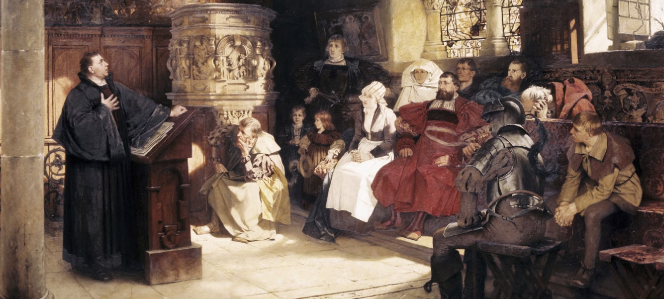No doubt to commemorate the 500th anniversary of the Protestant Reformation, the Pew Research Center released a study on U.S. and European Catholic-Protestant relations. And I must say, this was a rare instance where I discovered a Pew religious survey without first being tipped off by the Catholic internet world. Perhaps the reason this flew under the radar is because of the predictable punchline: Catholic and Protestant acrimony is at an all-time low, with most Protestants and Catholics viewing each other as fellow Christian brothers and sisters. That’s undoubtedly a great thing but is nothing new, as other surveys over the past decade gave us similar results. Yet, within the study were a few statistics that completely blew me away:
- About half of U.S. Protestants (52%) adopt a Catholic view of justification, saying both good works and faith are needed for salvation rather than the “faith alone” (sola fide) Protestant position. The same percentage acknowledges Christianity’s sacred traditions and rejects the other main feature of Protestantism: the “bible alone” (sola scriptura).
- Combining the two, just 30% of all U.S. Protestants affirm both sola fide and sola scriptura.
- Even among weekly church-going evangelicals, a substantial minority (41%) rejects either sola fide or sola scriptura.
- In nearly all of the European countries surveyed, majorities or pluralities of Protestants adhere to the traditionally Catholic view that both faith and good works are necessary to attain salvation.
Thus, the vast majority of Protestants have adopted the Catholic position on at least one of the two (and often both) principal theological controversies of the Reformation. Does this mean that Protestants are becoming more Catholic? It’s a loaded question, and one that dovetails with the Word on Fire Show’s recent discussion of a Stanley Hauerwas article in The Washington Post. Hauerwas, a Protestant theologian, argues that Vatican II effectively extinguished the last vestiges of Catholic practice to which Protestants protested. Thus, Hauerwas believes “Protestants won.” But for Hauerwas, this is not Protestant triumphalism. Instead, it is the starting point to ask: if there is nothing left to protest, should Protestants return to Mother Church?
A voice like Hauerwas is important to highlight the fact that Protestantism emerged out of Catholicism and that we share a common historical starting point in the desire for reform of the early sixteenth century Church. We tend to forget that there were many loyal Catholics who shared Luther’s earliest goals of reform. Some of them became canonized saints. I think here of St. Thomas More, who is famous for martyrdom but nearly forgotten for his earlier efforts at Church reform. Indeed, More’s life can largely be explained by a desire to purify the Church, first from its pre-Reformation corruption and later from its post-Reformation fracture. We similarly tend to forget that Luther was initially committed to Church integrity and that it was his theological errors rather than his rage against Church corruption that got him excommunicated. So, if the Reformation were merely a struggle to check abuses and rein in clericalism, there might not be any Catholic-Protestant divide at all. Hauerwas would be on to something and, in truth, both camps could mutually declare victory. The problem, of course, is that the Reformation became something much more than that.
Among other things, the Reformers rejected purgatory, freewill, and, in various combinations, the sacraments, all of which have carried through to the present day, with the disputed doctrines multiplying through the cascading effect of faction that haunted the Reformation from the beginning. But I sense that, for a modern Protestant, those abstract theological issues may be less problematic than confession, the priesthood, or mandatory fasting days during Lent. For a contemporary crowd, those issues give a better voice to the Reformation’s central controversy: authority.
A priest in my area remembers a time in his youth when the Protestant Reformation was called the “Protestant Revolt.” For obvious ecumenical reasons, we do not call it that anymore. But it’s an honest recognition that a discussion about the Reformation is necessarily incomplete without talking about authority. Did Jesus establish a visible Church with a living voice of authority to preserve and pass on the faith he gave his apostles? That is the meta-question behind everything else. And while many Protestants are beginning to see the perilous dangers of having anyone with a Bible and “inspiration from the Spirit” lay claim to the title “Christian” (think Westboro Baptist Church), the question of authority remains a source of confusion, suspicion, and resentment. That contemporary secular society is obsessed with autonomy and enamored of dissent doesn’t help. Indeed it goes a long way in explaining how a YouTube video called “Why I love Jesus but Hate Religion” can go viral despite its obvious practical, historical, theological, and scriptural problems.
So are Protestants moving closer to Catholicism? One interpretation is that Protestants are just less Protestant and that secular erosion of classical Protestantism does not necessarily result in more Catholicism. That is probably true for some. But the Pew survey reveals widespread adoption of Catholic theological positions, which, in my mind, warrants a very cautious but optimistic “yes.” A hundred years ago, a world where most Protestants agree with the Catholic Church on at least one of the Reformation’s two main theological controversies would have seemed impossible. The Pew study proves it is not. If that is possible, anything is possible, including the ultimate goal of Christian unity. And that is tremendously joyful news.
